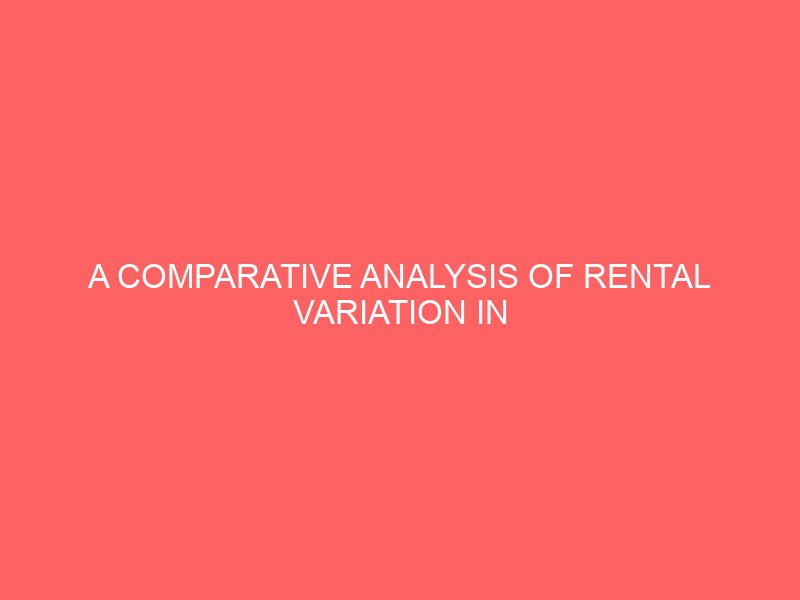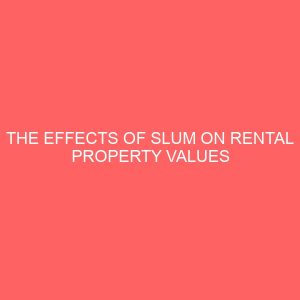Description
CHAPTER ONE
1.0 INTRODUCTION
1.1 BACKGROUND OF THE STUDY
Shelter is a basic necessity in life. An individual can satisfy this need by either occupying his own owners occupier property or renting another persons property. In our traditional society, the need for shelter is mainly met through the first alternative that is owner occupation. With the emergency of urban centers, the situation has changed. Many people are no longer about to own property because of the difficulty in the acquisition of land and the high cost of building construction. Therefore, they are left with the alternative of renting other peoples properties in order to satisfy their need for shelter. Consequently two classes of urban resident have emerged, the landlord and the tenant under this arrangement the tenant pays to the landlord a certain amount of money in consideration for his use of the landlords house. This amount is popularly known as rent.
During the civil war the Nigeria that is 1966 to 1970 many landed properties in the urban areas of the former Eastern Region of Nigeria, including Enugu, were destroyed. Consequently, there was a sharp decline in the supply of landed properties after the war. Furthermore, the post civil war period witnessed an unprecedented number of the rural population trooping into the urban centres due to the conspicuous prosperity brought about in the urban area by the oil boom.
1.2 STATEMENT OF PROBLEM
Location of economic properties has been a difficult concept to understand. Although the primary objective of commercial properties is the derivation of financial gains, while that of residential properties is for habitation, shelter and comfort, the demand for land is a reflection of the profitability or utility derivable from its use. The greater the benefit to be obtained from a particular use, the higher the rent that the user will be willing to pay for it.
1.3 AIM AND OBJECTIVES OF THE STUDY
The main aim of this research is to examine the reasons for rental variation in commercial and residential properties with a view to provide tool to be used in catching issues related to rent on these properties in Enugu and Nigeria generally.
To achieve the standard goal, the following objectives are to be pursued;
i To identify the level of rents for commercial and residential properties in the study area.
ii To ascertain and examine the factors influencing the rents being commanded by these properties.
iii To determine or examine whether the income of prospective buyers/tenants affect their decision to acquire properties.
1.4 RESEARCH QUESTIONS
i. What is the level of rent for commercial and residential properties in Ogui New Layout and G.R.A respectively between years 20022004
ii. What are the factors influencing rents passing on those commercial and residential properties.
iii. Does the income of prospective buyers/tenants affect their decision to acquire properties
iv. Is there any disparity in the rental value or rent passing on residential and commercial properties in the study area
1.5 SIGNIFICANCE OF THE STUDY
The finding of this study will be of benefit to the following groups;
Firstly, tenants who are charged rents based on different reasons, especially when the properties are of the same nature physically. This will again enable the investors not only to understand how occupier thinks, but also why and the things they consider before acquiring properties for certain uses.
Secondly, the generality of the public can now understand the reason why the rents being commanded by these properties have to differ.
1.6 SCOPE OF THE STUDY
The study covers a period of three years 2002 to 2004 and it is restricted to selected properties Residential and commercial comprising blocks of flat and tenements in Ogui New Layout and G.R.A, Enugu.
1.7 LIMITATIONS OF THE STUDY
Expectedly, this work met with some hindrances during the stage of data collection. The issue of rent passing on a property residential or commercial is usually regarded as classified information, which is not easily disclosed to people particularly researchers. This was largely suspected to be the reason why some Estate surveyors, property owners, tenants, Estate firms, property companies and even Estate agents who were approached through oral interviews, discussions and visitations found it rather difficult to reveal essential information despite every explanation that the exercise is strictly for academic purposes, a good number of them, still nursed the fear that it may be for property rating and taxation purposes








Reviews
There are no reviews yet.